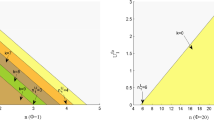Abstract
We consider a memoryless first-come first-served queue in which customers' waiting costs are increasing and convex with time. Hence, customers may opt to renege if service has not commenced after waiting for some time. We assume a homogeneous population of customers and we look for their symmetric Nash equilibrium reneging strategy. Besides the model parameters, customers are aware only, if they are in service or not, and they recall for how long they are have been waiting. They are informed of nothing else. We show that under some assumptions on customers' utility function, Nash equilibrium prescribes reneging after random times. We give a closed form expression for the resulting distribution. In particular, its support is an interval (in which it has a density) and it has at most two atoms (at the edges of the interval). Moreover, this equilibrium is unique. Finally, we indicate a case in which Nash equilibrium prescribes a deterministic reneging time.
Similar content being viewed by others
References
D. Assaf and M. Haviv, Reneging from time sharing and random queues, Math. Oper. Res. 15 (1990) 129-138.
F. Baccelli and G. Hebuterne, On queues with impatient customers, in: Performance '81, ed. F.J. Kylstra (North-Holland, Amsterdam, 1981) pp. 159-179.
A. Glazer and R. Hassin, Stable priority purchasing in queues, Oper. Res. Lett. 4 (1986) 285-288.
R. Hassin and M. Haviv, Equilibrium strategies for queues with impatient customers, Oper. Res. Lett. 17 (1995) 41-45.
R. Hassin and M. Haviv, Optimal and equilibrium retrial rates in a busy system, Probab. Engrg. Inform. Sci. 10 (1996) 223-227.
A. Mandelbaum and N. Shimkin, A model of rational abandonments for invisible queues, Queueing Systems (1998) to appear.
E. Zohar, A. Mandelbaum and N. Shimkin, Adaptive behavior of imapatient customers in tete-queues: Theory and empirical support (2000) submitted for publication.
Author information
Authors and Affiliations
Rights and permissions
About this article
Cite this article
Haviv, M., Ritov, Y. Homogeneous Customers Renege from Invisible Queues at Random Times under Deteriorating Waiting Conditions. Queueing Systems 38, 495–508 (2001). https://doi.org/10.1023/A:1010908330518
Issue Date:
DOI: https://doi.org/10.1023/A:1010908330518




